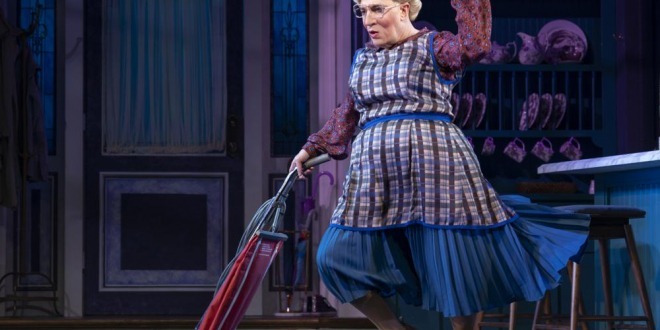The advent of new plays based on successful movies is one obvious evidence that Broadway is on the mend. “Mrs. Doubtfire” is the most recent, a wonderfully clumsy tribute to shattered families from the mid-1990s that comes in the tumultuous 2020s.
What debuted at the Stephen Sondheim Theatre on Sunday is the musical equivalent of a softball in the middle: a safe, appropriately updated translation of a known narrative with a great leading man, a few moments of craziness, and pro forma tunes that fade from memory like one of the many fast changes.
Rob McClure, the immensely brilliant actor who plays an actor who dresses as his children’s portly Scottish nanny in order to spend time with them after losing custody in a divorce, takes on the titular character that the late Robin Williams made iconic on film. “This won’t put me in therapy,” one of his children declares.
McClure has deserved a role that showcases his abilities for a long time, and this is it: impressions — including Darth Vader, Donald Trump, and Yoda — and a remarkable agility to dance in a fat suit, sing tenderly in a duet, breakdance, catch multiple airborne butter sticks in a pot, and demonstrate an almost Ed Sheeran ability to create overlapping vocal loops while manipulating two puppets.
The creators behind the original 2015 musical “Something Rotten!” are the same – storywriters Karey Kirkpatrick and John O’Farrell, with lyrics by Kirkpatrick and his brother, Wayne. This time, though, they’ve had to stick to a pre-determined script and are required to include all of the movie’s notable moments, such as the “run-by fruiting,” the burning shirt, and the cry of “Poppets!”
When a stressed Doubtfire contacts the computer assistant Siri for help cooking dinner, a whole dance sequence breaks out, or when the stress of the deceit drives a strange number with 12 Doubtfires on stage at once, “Mrs. Doubtful” is at its best.
The writers have removed some of the film’s more awkward scenes, such as Doubtfire fending off the advances of an enamored male coworker, and have given songs to everyone, including the kids, estranged wife, new lover, social worker, closest friends, and a trio of Spanish restaurant singers.
Analise Scarpaci, who plays his oldest daughter with emotion and stuns with her voice, is another standout performance, in addition to McClure. Brad Oscar and Peter Bartlett, both veterans of “Something Rotten!” add humorous flair but never get out of second gear. The lyrics are a tad too twee, with the words “British” and “Brad Pitt-ish” rhymed.
As it lurches toward its sweet conclusion, one major point that needs to be addressed is the fact that there’s a male in a dress — again again. “Mrs. Doubtfire” follows on the heels of another guy-in-drag comedy adaptation, “Tootsie,” which debuted shortly before the epidemic and drew criticism for being transphobic.
Both stories include cisgender guys donning gowns and posing as women to become better versions of themselves. “I’ve been looking at things from a different angle,” our hero tells his ex.
McClure’s character in “Mrs. Doubtfire,” who has snatched the fear of erasure from so many, is more like a spy, wanting to communicate with his children. He doesn’t hurt anyone, but it’s still deception in disguise, and the discourse only touches on gender in the most basic manner, never mentioning gay identity or oppression. It’s bare, as if it’s too afraid to take advantage of the situation.
There are troubling hints that the creators of “Mrs. Doubtfire” haven’t fully grasped the concept of perspective. They believe that a guy in a frumpy dress will be as startling and amusing to viewers as it was when the “X-Files” initially debuted. And the song “Make Me a Woman,” performed by a stereotypical, over-the-top gay couple, makes a shocking distinction between gorgeous women such as Cher, Lady Diana, Jackie Onassis, and Grace Kelly, and non-hot women such as Margaret Thatcher, Janet Reno, Julia Child, and Eleanor Roosevelt.
Hopefully, we’ve moved on from that. Even the show’s title appears to be out of date: “Mrs.” is the first word in the new musical’s title, an immediate clue that it belongs to a different time in a world where the performers in the Playbill reveal their preferred pronouns. “Is it too late for me to change?” the protagonist sings. Yes, it is, sir. Please remove that dress now.

